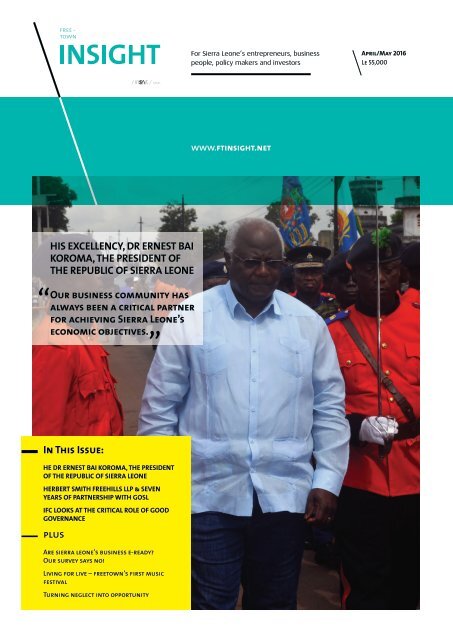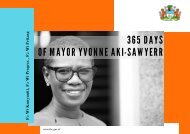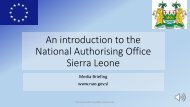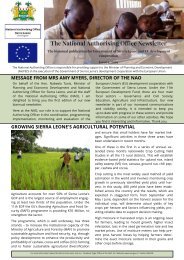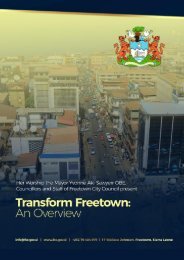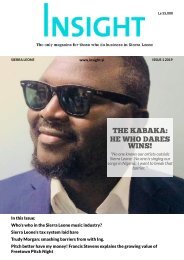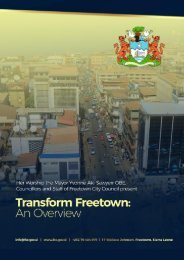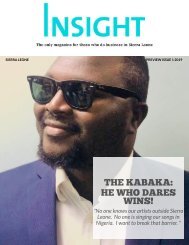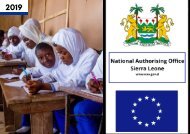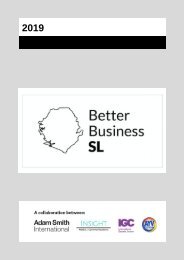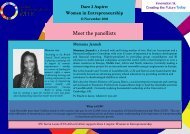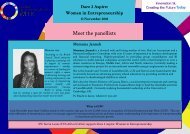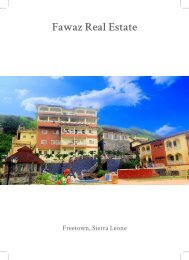FTInsight April/May 2016
Create successful ePaper yourself
Turn your PDF publications into a flip-book with our unique Google optimized e-Paper software.
For Sierra Leone’s entrepreneurs, business<br />
people, policy makers and investors<br />
<strong>April</strong>/<strong>May</strong> <strong>2016</strong><br />
Le 55,000<br />
www.ftinsight.net<br />
HIS EXCELLENCY, DR ERNEST BAI<br />
KOROMA, THE PRESIDENT OF<br />
THE REPUBLIC OF SIERRA LEONE<br />
Our business community has<br />
always been a critical partner<br />
for achieving Sierra Leone’s<br />
economic objectives.<br />
“<br />
”<br />
In This Issue:<br />
HE DR ERNEST BAI KOROMA, THE PRESIDENT<br />
OF THE REPUBLIC OF SIERRA LEONE<br />
HERBERT SMITH FREEHILLS LLP & SEVEN<br />
YEARS OF PARTNERSHIP WITH GOSL<br />
IFC LOOKS AT THE CRITICAL ROLE OF GOOD<br />
GOVERNANCE<br />
plus<br />
Are sierra leone’s business e-ready?<br />
Our survey says no!<br />
Living for live – freetown’s f irst music<br />
festival<br />
Turning neglect into opportunity
Editor’s Insight<br />
Welcome to the <strong>April</strong>/<strong>May</strong> edition of Freetown Insight – our third. This edition is tremendously significant to<br />
us for three reasons. Firstly, it is the first time we have been honoured to be able to publish a piece by His<br />
Excellency, Dr Ernest Bai Koroma, the President of Sierra Leone. The President’s piece focuses on private sector<br />
investment into the country and ties in with our forthcoming London-based investment forum – Invest Sierra<br />
Leone <strong>2016</strong>. In it he reinforces the importance of the private sector to our recovering economy, and writes:<br />
“Great opportunities and challenges beckon as we embark upon the journey towards forging a win-win<br />
partnership for our country’s enormous investment and trade potential. In a global economy, all our futures are<br />
intertwined and I look forward to building productive relationships with the private sectors of nations across the<br />
world.”<br />
This issue of the magazine also coincides with Sierra Leone’s Independence Day. After more than 150 years of<br />
British colonial rule, Sierra Leone was finally able to celebrate its independence on the 27th <strong>April</strong> 1961. Real<br />
economic independence has been slow to follow, but there is a growing impetus that solutions for African<br />
problems must be developed within Africa and tailored to our particular circumstances. This is not a call for<br />
insularity; it is a suggestion that we appreciate and learn about independence from the achievements of our<br />
private sector and their approach to sustainability.<br />
We count amongst our business leaders, individuals who have steered their companies to success through<br />
great political, economic and social upheaval. In our four months of existence, Freetown Insight magazine has<br />
spoken to a number of Sierra Leone’s most successful business men and women. They repeatedly reference<br />
the significance of hard work, persistence, resilience, team work, and continuous professional and personal<br />
development. They make sacrifices that are often personal as well as professional; and without exception<br />
they have had to struggle to secure the finance they need to set up their business ventures. They have taken<br />
responsibility for their own destiny and show that success necessitates self-belief, self-denial, self-development<br />
and self-reliance. Our entrepreneurs are a wonderful microcosm of the independence that Sierra Leone could<br />
and should achieve.<br />
FT<br />
Insight<br />
3<br />
Invest Sierra Leone <strong>2016</strong>, a collaboration with Herbert Smith Freehills, the leading international law firm, is<br />
scheduled for the 5th <strong>May</strong> and is the only annual forum dedicated to investment in Sierra Leone. The event puts<br />
our country’s investment potential and investment pioneers centre stage. In the pages that follow, it becomes<br />
clear from the experience of existing investors, that Sierra Leone offers substantial opportunities for the farsighted<br />
in a range of areas that haven’t traditionally caught the eye of the international investment community<br />
- agriculture, fisheries, tourism, hotels and hospitality, energy and infrastructure to name a few.<br />
Neglected areas with great potential but as Paddy Docherty of Phoenix Africa says in his piece for Freetown<br />
Insight: “To an entrepreneur, neglect naturally means opportunity.”<br />
Freetown Insight<br />
+44 771 722 1023<br />
info@ftinsight.net<br />
Editor:<br />
Memuna Forna<br />
Art Director:<br />
Erika Perez-Leon<br />
Contributors:<br />
HE Dr Ernest Bai Koroma, President<br />
of the Republic of Sierra Leone<br />
Chinyere Almona, Africa Corporate<br />
Governance Programme<br />
Ishmael Beah, Sierra WiFi<br />
Paddy Docherty, Phoenix Africa<br />
Advertising Enquiries:<br />
info@ftinsight.net<br />
+44 771 722 1023 / +232 7879 9999<br />
TABLE OF CONTENTS<br />
Land of great potential & untapped opportunities.<br />
By H.E. Dr Ernest Bai Koroma . . . . . . . . . . . . . . . . . 8<br />
High taxes or high investment?<br />
FT Insight poll results . . . . . . . . . . . . . . . . . . . . . 14<br />
To an entrepreneur, neglect naturally means opportunity<br />
By Paddy Docherty . . . . . . . . . . . . . . . . . . . . . . 16<br />
Seizing the corporate governance opportunity<br />
By Chinyere Almona . . . . . . . . . . . . . . . . . . . . . 18<br />
Digital content for socio-economic growth<br />
By Ishmael Bull . . . . . . . . . . . . . . . . . . . . . . . . 21<br />
E-ready for e-commerce? Sierra Leone’s<br />
businesses have some way to go . . . . . . . . . . . . . 22<br />
Are small solar systems, the way to light<br />
up Sierra Leone? . . . . . . . . . . . . . . . . . . . . . . . 26<br />
www.ftinsight.net
Insightful<br />
Remittances - the money migrants send to their countries of<br />
origin from their host countries, are increasingly significant<br />
for West Africa. In 2014, the amount sent home totaled US<br />
$26 billion (of which US $20.9 billion was sent to Nigeria)<br />
and amounted to 3.2% of the region’s GDP. The magnitude of<br />
these transfers, which make West Africa the second recipient<br />
subregion on the continent, ref lects the size of the West African<br />
diaspora, estimated at 9.1 million people in 2011, or 2.6% of the<br />
population of the region.<br />
A remittance is a transfer of money by a foreign worker to an individual<br />
in his or her home country. Money sent home by migrants competes with<br />
international aid as one of the largest f inancial inf lows to developing<br />
countries. Workers’ remittances are a signif icant part of international<br />
capital f lows, especially with regard to labour-exporting countries.<br />
in Sierra Leone remittances increased by<br />
over 50% between 2013 and 2014 with<br />
the Ebola virus disease outbreak.<br />
Remittance f lows to and<br />
within Africa approach<br />
US$40 billion.<br />
Countries in Northern Africa (for example,<br />
Morocco, Algeria and Egypt) are the<br />
major receivers in the continent. Eastern<br />
African countries depend heavily on<br />
these flows, with Somalia standing out<br />
as particularly remittance dependent.<br />
The $600bn global remittance<br />
market is becoming more<br />
fragmented, as regulators<br />
scramble to keep up with<br />
a surge in digital-only<br />
platforms and increased<br />
demand for money transfers<br />
from a growing number of<br />
international migrants.<br />
(Financial Times 29 December 2015)<br />
For the entire region, annual average<br />
remittances per migrant reach almost<br />
US$1,200 and on a country-by-country<br />
average represent 5 per cent of GDP and 27<br />
per cent of exports.<br />
African and European leaders in<br />
November pledged to cut money<br />
transfer costs below 3 per cent by<br />
2030 in an attempt to ease the burden<br />
on migrants who emigrate for<br />
work and send money home to their<br />
families. (Financial Times 29 December 2015)<br />
South-South migration is larger than South-North<br />
migration. Over 38 percent of the international<br />
migrants in 2013 migrated from developing<br />
countries to other developing countries, compared<br />
to 34 percent that moved from developing<br />
countries to advanced countries.<br />
Remittances are private flows of<br />
resources mostly intended for<br />
direct consumption and household<br />
support.
international migrants will send $601 billion to their families in their<br />
home countries this year, with developing countries receiving $441<br />
billion, says the Migration and Remittances.<br />
Factbook <strong>2016</strong><br />
Currently, no uniform and authoritative historical data on<br />
informal f lows exist. Given the widespread use of informal<br />
remittance channels, the data should be regarded as<br />
underestimates of total f lows.<br />
The United States was the largest remittance source country, with an estimated $56 billion in<br />
outward flows in 2014, followed by Saudi Arabia ($37 billion), and Russia ($33 billion). India<br />
was the largest remittance receiving country, with an estimated $72 billion in 2015, followed<br />
by China ($64 billion), and the Philippines ($30 billion).<br />
The top destination countries<br />
for Sierra Leonean emigrants are<br />
Guinea, the United States, the United<br />
Kingdom, Liberia, Senegal, Germany,<br />
the Netherlands, Australia, Nigeria,<br />
Canada.<br />
The African Institute for Remittances was<br />
launched on 28th November, 2014 to<br />
build the capacity of the Member States<br />
of the African Union, remittance senders<br />
and recipients and other stakeholders<br />
to develop and implement concrete<br />
strategies and operational instruments<br />
to use remittances as development tools<br />
for poverty reduction.<br />
Remittances to sub-Saharan<br />
Africa cost the most. Sub-<br />
Saharan Africa also has the<br />
least eff icient retail payment<br />
systems and regulation that<br />
creates high barriers to entry.<br />
Globally, sending remittances costs an average of 7.37<br />
percent of the amount sent. This figure is used to monitor<br />
the progress of the global effort for reduction of remittance<br />
prices.<br />
South Africa remains the most costly G20 country<br />
to send remittances from, and this is despite a<br />
decline of about 5 percentage points in the last<br />
two years, when the cost of sending from South<br />
Africa was in excess of 20 percent. The cost of<br />
sending from the second most expensive G20<br />
sending country – Japan – was recorded at 11.95<br />
percent, falling below 12 percent for the first<br />
time in the history of RPW. Russia remains the<br />
least expensive G20 sending country, followed by<br />
Saudi Arabia (5.05 percent). Korea (5.54 percent)<br />
and the USA (5.93 percent).<br />
Location, Location, Location! Remittance<br />
costs vary widely between different service<br />
providers. Commercial banks, at 13 percent,<br />
remain the most expensive option for<br />
sending money unless they have dedicated<br />
remittance services. At 7 percent, specialised<br />
money transfer operators are the cheapest<br />
option.<br />
FT<br />
Insight<br />
5<br />
If the cost of sending remittances could be reduced by 5 percentage points, remittance<br />
recipients could receive over $16 billion more each year.<br />
www.ftinsight.net
the only annual forum dedicated to<br />
investment in Sierra Leone<br />
5 <strong>May</strong> <strong>2016</strong><br />
http://www.ftinsight.net/invest-sierraleone-<strong>2016</strong>.html
Invest Sierra Leone <strong>2016</strong><br />
Special<br />
Sierra Leone’s only annual<br />
investment forum returns<br />
on 5 <strong>May</strong> <strong>2016</strong><br />
Invest Sierra Leone, the only annual forum dedicated<br />
to encouraging investment into Sierra Leone, returns<br />
to London on 5 <strong>May</strong> <strong>2016</strong>. Endorsed by the Sierra Leone<br />
Investment and Export Promotion Agency (SLIEPA), Invest<br />
Sierra Leone is a not-for-prof it collaboration between<br />
leading global law f irm - Herbert Smith Freehills LLP<br />
and Freetown Insight magazine, Sierra Leone’s only<br />
business journal. It follows on from last year’s successful<br />
inaugural event - Post Ebola economic renaissance in<br />
Sierra Leone and the role of the private sector - which was<br />
held in the House of Commons.<br />
The forum follows a panel debate format intended to identify innovative approaches to investment in Sierra<br />
Leone and gives interested investors the opportunity for in-depth discussion with government ministers, CEOs,<br />
financiers and the country’s most successful business and investment pioneers.<br />
FT<br />
Insight<br />
7<br />
It is chaired once again by the Rt Hon David Lammy MP. Confirmed panellists include Dr Samura Kamara, Sierra<br />
Leone’s Minister of Foreign Affairs and International Cooperation; Dr Kaifala Marah, Governor Designate of the<br />
Bank of Sierra Leone; Guy Warrington, High Commissioner Sierra Leone Designate; Amara Kuyateh, Deputy<br />
Director General of Sierra Leone’s National Social Security and Investment Trust; Paddy Docherty, Chief Executive<br />
of Phoenix Africa Development Company; and Tom Cairnes, founder of ManoCap – the Africa focused private<br />
investment firm.<br />
The context for this year’s event is provided by Sierra Leone: An Investor Guide. Produced by Herbert Smith<br />
Freehills, Standard Chartered and Prudential plc and launched by H.E. Dr. Ernest Bai Koroma, President of the<br />
Republic of Sierra Leone, the guide outlines the opportunities the country offers, and resources that potential<br />
investors can draw on.<br />
Invest Sierra Leone <strong>2016</strong> will be followed by an exclusive screening of the trailer for ‘Sierra Leone’, a major<br />
feature documentary from an Oscar, Emmy and Grammy award winning team. Due to be released in 2017, the<br />
film tells the story of Charlie Haffner, Sierra Leone’s most beloved theatre director, and his mission to create<br />
a play to galvanise his people and unite them around a better vision of the future. The film’s award winning<br />
producer, Sorious Samura, will be on hand to give a short talk about the project.<br />
The Organisers<br />
Herbert Smith Freehills is now in the seventh year of its ground-breaking partnership with the Government<br />
of Sierra Leone (GoSL), providing GoSL with legal assistance on a pro bono basis to help build its capacity to<br />
manage inward investment into Sierra Leone.<br />
Freetown Insight is Sierra Leone’s only magazine dedicated to business and investment in the country. It was<br />
launched in December 2015 and is published six times a year.<br />
The Sierra Leone Investment and Export Promotion Agency is responsible for the promotion and facilitation<br />
of private sector investments into Sierra Leone. It works with the Government of Sierra Leone and the private<br />
sector to develop a globally competitive business environment, and acts as the first point of contact for foreign<br />
investors, providing information and support on setting up a business. http://www.investsierraleone.biz
Change Maker<br />
Sierra Leone – land of<br />
great potential and<br />
untapped opportunities<br />
By H.E. Dr. Ernest Bai Koroma,<br />
President of the Republic of<br />
Sierra Leone<br />
In February last year, our battle against the Ebola epidemic was beginning to<br />
yield dividends, when I was asked to write the programme foreword for the<br />
inaugural ‘Invest Sierra Leone’ forum which was held in the House of Commons.<br />
Several months later, as we approached victory against the virus, I contributed the<br />
foreword for Herbert Smith Freehills’ ‘Sierra Leone: An Investor’s Guide’. While the<br />
primary tragedy of the outbreak was the terrible devastation and human suffering<br />
it caused; these two initiatives, aimed at increasing investment into the country,<br />
were both reflective of the urgent need to address the catastrophic economic<br />
consequences of the epidemic and the private sector’s continuing commitment to<br />
the economic development of Sierra Leone.<br />
Our business community has always been a critical partner for achieving Sierra Leone’s economic objectives.<br />
From my first term’s ‘Agenda for Change’, to the ‘Agenda for Prosperity’, Sierra Leone has pursued the vision of<br />
an inclusive economy, with reduced poverty and greater opportunities for all people; and before we were struck<br />
by Ebola, ours was one of the world’s fastest growing economies. Political stability and sound macroeconomic<br />
fundamentals had led to increased FDI (net) inflows totaling US$2bn over 2010-14, up steeply from US$402mn<br />
on the previous five-year period.<br />
We have now defeated the Ebola outbreak and completed the<br />
f irst phase of our recovery programme. This underpins our<br />
determination and ability to rediscover that economic success<br />
by strengthening entrepreneurship, by continuous economic<br />
diversif ication and innovation; by growing our trade relations<br />
and by upgrading our industrial sector.<br />
Already, this March, the International Monetary Fund has confirmed that “Sierra Leone’s economy is recovering<br />
from the twin shocks of the Ebola virus epidemic and the halt in iron-ore mining. Economic momentum is<br />
building again, and GDP is expected to grow by 4.3 percent this year from a contraction of 21 percent in 2015.…”<br />
We are still not at pre - Ebola levels even though we are on course to achieve our objective of full economic<br />
recovery. But we cannot do it alone; the private sector – both national and international - has to be at the very<br />
heart of our recovery plan.<br />
As a business man before I become President, I have direct personal experience of the workings and challenges<br />
of Sierra Leone’s business environment; and I am fully aware that creating trust in our systems and processes is<br />
key to attracting international investment and improving private sector confidence. Investors, both national and<br />
international, will want to know how we intend to improve on the favourable investment climate. Questions<br />
about the stability of foreign investments in the country, the application of the rule of law for business and the<br />
right policies to attract foreign investment without undermining internal revenue generation will be asked.<br />
Frank and objective dialogue between the private sector and the Government of Sierra Leone is an important<br />
step in the journey forward, and independent initiatives such as ‘Invest Sierra Leone’, ‘Freetown Insight’<br />
magazine and ‘Sierra Leone: An Investor’s Guide’ make an important contribution to that process.
FT<br />
Insight<br />
9<br />
There have been real lessons learned about the need for economic diversification, and our priorities align with<br />
a diverse range of opportunities across various sectors – amongst them are infrastructure, health, education,<br />
agriculture, construction, electrification and ICT.<br />
For example, only about one-fifth of our 5.4 million hectares of available farmland is presently used for crop<br />
growing. Our immediate priority is to increase production and productivity, focusing on rice and cassava and cash<br />
crops such as cocoa and oil palm. Additionally, we should be able to add value to our wide range of crops by<br />
processing them in country. We are also fortunate to be home to the third largest natural harbour in the world;<br />
and our strategic location adjacent to European market shipping lanes has long made Sierra Leone a popular<br />
trading and refueling location. The Government is devising an extended programme to develop Freetown as<br />
a trans-shipment global trade hub by improving the management and renovation of the port. This will create<br />
demand for port services equipment, management expertise and rehabilitation engineering. The ecotourism<br />
potential of our diverse landscape of islands, rivers, mountains, spectacular beaches and lush vegetation is barely<br />
tapped. Hotels, tours and other leisure gateways are exciting possibilities in a country that is only about six hours<br />
from Europe.<br />
These are just a few of the investment possibilities we have on offer. The collaboration between Freetown<br />
Insight magazine and Herbert Smith Freehills that has resulted in an annual commitment to the ‘Invest Sierra<br />
Leone’ forum will encourage potential investors to explore many more. This is a dynamic and transformational<br />
moment for Sierra Leone. Great opportunities and challenges beckon as we embark upon the journey towards<br />
forging a win-win partnership for our country’s enormous investment and trade potential. In a global economy,<br />
all our futures are intertwined and I look forward to building productive relationships with the private sectors of<br />
nations across the world.<br />
www.ftinsight.net
38 Spur Road, Freetown | Tel: +232 77 399399 | Website: www.swissspirithotels.com/freetown<br />
38 Spur Road, Freetown | Tel: +232 77 399399 | www.swissspirithotels.com/freetown
Invest Sierra Leone <strong>2016</strong><br />
Special<br />
Seven years of a groundbreaking<br />
partnership - Herbert<br />
Smith Freehills and the GoSL<br />
Leading international law f irm, Herbert Smith Freehills (HSF) is<br />
now in the seventh year of Fair Deal Sierra Leone - its ground<br />
breaking partnership with the Government of Sierra Leone<br />
(GoSL), providing legal assistance on a pro bono basis to help<br />
build Sierra Leone’s capacity to manage inward investment.<br />
The firm offers its services to GoSL for free, where it does not have sufficient financial, legal and human<br />
resources to achieve the best results for the country, but where it can benefit from world class legal assistance<br />
on supporting deal negotiation with international investors, helping bridge skills gaps to redress the balance<br />
when negotiating with large well-advised international investors.<br />
HSF works across a range of Government departments and bodies, including the President’s office, the Ministries<br />
of Energy, Health, Trade and Agriculture, the Attorney General’s office, the Law Officers’ Department and the<br />
investment promotions and PPP agencies; and coordinates with other development partners of GoSL (including<br />
DFID, UNDP, the World Bank, and the Africa Governance Initiative).<br />
Since its involvement with GoSL began in 2010, over 100 people<br />
across HSF have delivered over £2m worth of support, in what is<br />
believed to be the f irst pro bono facility focused by a law f irm on this<br />
scale in support of one country’s development efforts.<br />
FT<br />
Insight<br />
11<br />
In one example HSF was asked by the Ministry of Health to assist with the establishment of the National<br />
Pharmaceutical Procurement Agency, and the negotiation of its key supply contract. A team of HSF’s outsourcing<br />
specialists worked with GoSL for over a year alongside UNICEF and other international development agencies, to<br />
coordinate and support negotiation of the contract and creation of the requisite new legislation. On completion<br />
of the process, Zainab Hawa Bangura, Minister of GoSL, wrote: On behalf of the Government and people of<br />
Sierra Leone, I would like to extend my deepest thanks to Herbert Smith […] for your time, insights and hard<br />
work in assisting the Ministry of Health… and its partners in developing a final agreement to establish the …NPPU<br />
in Sierra Leone. […] I am deeply grateful for your invaluable help.<br />
HSF’s M&A partner Gavin Davies spent three months on his sabbatical living in Freetown in 2010, supporting<br />
the Government on deal negotiation and capacity building. Disputes associate Dan Hoyle was seconded to the<br />
Attorney General in 2011-2012 for seven months. He was followed by corporate associate Richard Woods, who<br />
spent two months of his sabbatical working with the Law Officers’ Department and the PPP unit in Freetown<br />
during the summer of 2013, and corporate associate Rebecca Perlman who was seconded to the PPP unit during<br />
February and March 2014.<br />
Rebecca Perlman of HSF says of the partnership and her experience working with the PPP Unit: “Fair Deal<br />
Sierra Leone was established by Herbert Smith Freehills to help the Government of Sierra Leone respond<br />
more effectively to growing volumes of foreign investment as part of its programme of recovery, growth and<br />
sustained development. We treat the Government of Sierra Leone like any other key global client, with a full<br />
relationship team and access to all of our expertise. We believe that Fair Deal Sierra Leone is a truly innovative<br />
project that demonstrates how lawyers can support and influence development outcomes at the highest levels,<br />
www.ftinsight.net
Invest Sierra Leone <strong>2016</strong><br />
Special<br />
CONTINUED<br />
focusing on capacity building to achieve sustainable change. We are now taking a central part in the debate<br />
with the international development community as to how lawyers can use their expertise to assist developing<br />
countries in this way.<br />
“The project also offers Herbert Smith Freehills’ team the chance to fulfil their international pro bono ambitions,<br />
to support their personal development beyond their usual working environments, and to gain unique experience<br />
of working on African matters. This is one of our global firm’s most significant and prestigious pro bono projects,<br />
fully aligned with our CSR programme, with many of our clients’ focus on Africa as a key growth market, and<br />
with our commitment to continuous innovation in our pro bono programme. Most of all, we are all enjoying this<br />
project enormously and are excited about the many ideas we have to build it further.”<br />
Herbert Smith Freehills:<br />
• Recognised as one of the world’s leading law f irms<br />
• A full service law f irm, expert in transactional,<br />
dispute and f inance work<br />
• Global experience across all key sectors including<br />
agribusiness, energy, government and public sector,<br />
infrastructure, international trade, PPP, project<br />
f inance, mining and transport work<br />
• A leading Africa practice<br />
• Award winning global pro bono projects
Herbert Smith Freehills<br />
in numbers<br />
• 25 off ices across Asia- Pacif ic, EMEA and North America<br />
• More than 3,000 lawyers worldwide<br />
• 470 partners<br />
• Eighth largest law f irm in the world by lawyers<br />
• Ranked f irst across the legal professional directories across a full<br />
range of practice areas<br />
Ernest Bai Koroma, President of Sierra Leone, The Times CEO Summit Africa, March 2012:<br />
[O]ur governments need help getting the best deal. As president, it is disheartening to get to the negotiating<br />
table and find yourself confronted by a phalanx of lawyers and accountants on one side of the table<br />
outnumbering your own side ten to one. In Sierra Leone, we have benefited immensely from generous pro-bono<br />
support from the London law firm, Herbert Smith.<br />
Rt Hon Dominic Grieve QC MP, UK Attorney General in a speech at Chatham House, July 2013:<br />
…there is clearly a lot of good work going on among British law firms. In terms of international pro bono work,<br />
Herbert Smith Freehills have been identified among the market leaders in London, in offering more than £1<br />
million of billable time to the government of Sierra Leone, in what must be one of the most laudable examples of<br />
international pro bono work in the City today.<br />
FT<br />
Insight<br />
13<br />
Tony Blair, Founder of the Africa Governance Initiative, August 2012:<br />
I was delighted that Herbert Smith established this programme with GoSL. I know that their support is proving<br />
to be a powerful tool in helping GoSL deliver the kind of sustainable, broad-based economic growth that will lift<br />
people out of poverty.<br />
Invest Sierra Leone, Sierra Leone’s only annual investment forum, is a collaboration between Herbert Smith Freehills, Freetown Insight and the<br />
Sierra Leone Investment and Export Promotion Agency (SLIEPA).<br />
www.ftinsight.net
Freetown Insight<br />
online Poll<br />
We asked:<br />
High taxes or high investment?<br />
Which would do more to reduce the gap<br />
between rich and poor in Sierra Leone?<br />
3<br />
2<br />
1<br />
1 High taxes on the wealthy and<br />
corporations to fund programmes<br />
that help the poor<br />
2 Low taxes on the wealthy and<br />
corporations to encourage investment<br />
and economic growth<br />
3 Other<br />
RESPONDENTS TO THE ONLINE POLL SAID:<br />
“Taxes are already very high in Sierra Leone and we need to encourage more investment especially among<br />
indigenous Sierra Leoneans, to expand employment opportunities for Sierra Leoneans.”<br />
“High taxes on the wealthy and corporations to fund programmes that help the poor? This is the logical thing to<br />
do, the reason that the wealthy and corporations have the money is due to them taking advantage of the poor,<br />
basically that is how they made their money, so they should be the ones to finance programmes for the poor. The<br />
more money one has, the more taxes the wealthy/corporations should pay.”<br />
“If taxes are increased this increase will then be passed down to the consumer which will not bridge the gap<br />
between the rich and poor, it will only make the situation worse. Tax incentives need to be developed to<br />
encourage investment in Sierra Leone from foreign business. Additional investment will encourage new business<br />
and employment opportunities for all of Sierra Leone, thus improving the GDP and the quality of life.”<br />
“The Government of Sierra Leone needs to improve the foreign investment incentives for the mining sector. Mining<br />
creates significant training and employment opportunities and often the contribution to the SL fiscus from PAYE<br />
payments is overlooked as are the indirect employment opportunities which result. The process for obtaining<br />
Mine Development Agreements is unclear. Much could be done in this regard but in the absence of internationally<br />
competitive fiscal terms, investors will pursue opportunities elsewhere. The lack of grid power is a major negative<br />
versus other countries as generating power at mine site is very costly, reducing the attraction for investors. These<br />
are serious issues which SL needs to address.”<br />
“The authorities seem to think that taxing imports at punitive rates is raising money, but it actually encourages<br />
businesses to bribe customs officials into under-valuing imports. Those that pay the high prices correspondingly<br />
charge more for their goods which affects everyone.”<br />
“Collect taxes!”<br />
“Get Companies to commit to Community Development Action Plans, and see that they honour their<br />
commitments. Already over the past 12 months nearly all Government of Sierra Leone Departments have<br />
doubled their charges, be it for Visas etc. Mining related application fees etc. Enforcing the collection of GST would<br />
also go a long way towards having money to spend on the poor. But unless corruption is rooted out/reduced, the<br />
gap between rich and poor will only widen. Don’t waste money on showcase projects like a new airport, rather<br />
put that money into a new hydroelectric scheme. There are many examples out there of how to grow a middle<br />
class, it just needs a willingness to do so and the commitment.”
Mano River Union<br />
The Mano River Union is an Intergovernmental Institution made up of Sierra Leone, Liberia,<br />
Guinea and Cote d’Ivoire. It aims to strengthen the capacity of Member States to integrate<br />
their economies and coordinate development programmes.<br />
Republic of Sierra Leone<br />
Capital: Freetown<br />
Population: 7,075,641 (49.1% men and 50.9% women)<br />
Area: 71,740 sq km (27,699 sq miles)<br />
Languages: English, Krio, Temne, Mende and a range of other indigenous languages<br />
Life expectancy: 48 years (men), 49 years (women)<br />
Currency: Leone<br />
Republic of Liberia<br />
Capital: Monrovia<br />
Population: 4.2 million<br />
Area: 99,067 sq km (38,250 sq miles)<br />
Languages: English, 29 African languages belonging to the Mande, Kwa<br />
or Mel linguistic groups<br />
Life expectancy: 56 years (men), 59 years (women)<br />
Currency: Liberian dollar<br />
FT<br />
Insight<br />
15<br />
The Republic of Guinea<br />
Capital: Conakry<br />
Population: 10.5 million<br />
Area: 245,857 sq km (94,926 sq miles)<br />
Languages: French, Susu, Fulani, Mandingo<br />
Life expectancy: 53 years (men), 56 years (women)<br />
Currency: Guinean franc<br />
The Republic of Ivory Coast<br />
Capital: Yamoussoukro<br />
Population: 20.6 million<br />
Area: 322,462 sq km (124,503 sq miles)<br />
Major languages: French, indigenous languages<br />
Life expectancy: 55 years (men), 58 years (women)<br />
Currency: CFA (Communaute Financiere Africaine) franc<br />
www.ftinsight.net
Invest Sierra Leone <strong>2016</strong><br />
Special<br />
Opinion<br />
To an entrepreneur,<br />
neglect naturally<br />
means opportunity<br />
By Paddy Docherty,<br />
Phoenix Africa<br />
I founded Phoenix Africa several years ago to build<br />
a series of social-impact businesses in post-con f lict<br />
countries in Africa. The business model is based on<br />
the realisation that countries recovering from civil<br />
war or armed insurgency are very often nothing like<br />
as dangerous and risky as one would imagine from<br />
a casual glance at the newspapers or TV; at the same<br />
time, because of the generally negative press (and an<br />
unhealthy dose of assumption), these countries are very<br />
badly neglected by most investors around the world,<br />
and suffer from a lack of inward capital f lows. To an<br />
entrepreneur, neglect naturally means opportunity,<br />
and my hunch was that post-conf lict Africa – as almost<br />
certainly the most forgotten group of countries on the<br />
planet – would offer plentiful business opportunities.<br />
In the early days of the company, I travelled to many countries on the continent, all at various stages of<br />
emerging from conflict, to research where we might go and precisely what we might do. We spent some time<br />
on a plan to establish a microfinance bank in South Sudan, before rightly deciding that the politics in the country<br />
were too unstable. From a list of other potential investment destinations, Sierra Leone stood out as the clear<br />
choice for our first project, and a very attractive place to begin work. It is the perfect fit for the Phoenix Africa<br />
model, being both highly neglected by international investors (thus offering plentiful opportunity) and at the<br />
same time being politically very stable and wonderfully peaceful and quiet.<br />
This is how Lion Mountains Agrico Ltd came into being. From my research trip around the country, the agriculture<br />
sector evidently offered much scope for development, especially when considering the enormous amounts that<br />
Sierra Leone spends on importing rice, the staple diet. We therefore began planning Lion Mountains with the aim<br />
of growing rice for domestic sale: a commercial undertaking that would simultaneously deliver a profound social<br />
impact to the local community and go some way to redressing the food security problem that Sierra Leone<br />
faces.<br />
From my perspective, the single biggest challenge in establishing the company was not to be found in Sierra<br />
Leone itself. The most difficult obstacle to overcome is the perception problem – the negative assumptions<br />
that many people make about the country, based on dim recollections of news reports from the worst days<br />
of the rebel war. Risk analysts sitting in London (who have typically never visited Sierra Leone, of course) are<br />
fond of declaring it a high-risk country, and this general perception has retarded investment. It is a tough task<br />
to raise money for a Sierra Leonean project. Happily, however, we managed to raise enough money to launch<br />
pilot phase operations in October 2014 – during the worst of the Ebola crisis – and are now firmly established<br />
as one of the key players in food production and processing, with our headquarters in Bo. We closed our Series<br />
A finance in August 2015, and are now working on finalising Series B, an investment that will provide for<br />
expansion to large-scale commercial farming.<br />
While it is the goal of Lion Mountains to farm rice at scale, the focus of the operation in the first 18 months has<br />
been the milling of rice that we buy in from a network of approximately 2,000 outgrowers around Bo District.
By going into the countryside and providing market linkage to many small farmers who have no other route to<br />
market, we have been able to both build a business and deliver a valuable social impact: most of our outgrowers<br />
are subsistence farmers with no other cash income. Even as we move to large-scale commercial farming over<br />
the next year, our Outgrower Programme will expand, and this year we expect to buy husked rice from about<br />
3,000 local smallholders. Besides the milling operation, we have been growing rice, soy beans and black-eyed<br />
beans at a small pilot farm in Lugbu Chiefdom, which in the last harvest delivered fully 2.73t of rice per hectare,<br />
a very healthy yield for the first full year of operation.<br />
While there are of course challenges to operating in Sierra Leone, we are very excited about the enormous<br />
potential. Few countries around the world offer the opportunity to go from a standing start to being the<br />
dominant player in a sector, but that is what we have under way with Lion Mountains. A key factor in this is our<br />
people. Managing Director Mike Gericke – surely one of the most highly experienced farmers working in Africa –<br />
has performed miracles on a regular basis to establish operations and make them successful. We are very lucky<br />
to have not only Paramount Chief Komrabai, Peter Penfold but also Dr Joe Demby on our board of directors,<br />
which has offered us great protection from corruption and helped us to get things done in good time.<br />
Lion Mountains has also benefitted from the strong support of the Ministry of Agriculture, including the direct<br />
backing of the Hon Minister Professor Monty Jones and Deputy Minister Marie Jalloh. Though the day-to-day<br />
challenges remain (power cuts, lack of readily available inputs, poor roads), such support helps us overcome<br />
them, and we look forward to collaborating further with the Ministry in the pursuit of our joint goal of food<br />
security for Sierra Leone.<br />
In the view of Phoenix Africa, Sierra Leone is a highly attractive place to do business. The perception problem<br />
and its negative effect on investors has provided us with an exceptional opportunity to become a key player<br />
in the agricultural sector. This is available to other entrants too. For those companies that can overcome the<br />
financing obstacles and assemble a team that can handle the daily challenges, the country offers plentiful<br />
opportunities in several other sectors. With Lion Mountains a key part of our portfolio, Phoenix Africa is<br />
committed to Sierra Leone for the long term. We would like to see many other investors seize this chance as<br />
well, and work with us to drive the development of this most excellent country.<br />
FT<br />
Insight<br />
17<br />
Paddy Doherty has two degrees in history from Oxford University, where he also won a Blue for boxing. He was in the oil & gas corporate finance<br />
team at PricewaterhouseCoopers in London, before joining the boutique investment bank Global Union (based in Bahrain) as a Director. After<br />
leaving the Middle East, he returned to PricewaterhouseCoopers to take up a role as Manager of the regional CEE & CIS energy corporate finance<br />
team, based in Prague; before leaving to establish Phoenix Africa. He was on the UK board of Millennium Promise 2010-2015 and a member of<br />
the World Economic Forum Global Agenda Council on Fragile States 2012-14. He is currently Chairman of Lion Mountains in Sierra Leone, the first<br />
Phoenix Africa business, and a Member of the Private Sector Delegation to the Committee on World Food Security at the UN FAO.<br />
www.ftinsight.net
Invest Sierra Leone <strong>2016</strong><br />
Special<br />
Seizing the<br />
corporate<br />
governance<br />
opportunity is<br />
essential if Sierra<br />
Leone is to secure<br />
investor conf idence<br />
By Chinyere Almona,<br />
Regional Program<br />
Manager, Africa<br />
Corporate<br />
Governance<br />
Program<br />
In its Agenda for Prosperity (2013-18), Sierra Leone laid<br />
out the ambitious goals of becoming an inclusive,<br />
green, middle income country by 2035, with specif ic<br />
targets of only 5% unemployment, and lifting 80% of<br />
its citizens above the poverty line. Governance and<br />
public sector reform is one of the eight agenda pillars<br />
intended to help the country achieve its goals. As one<br />
of the seven key areas, Governance is also a critical<br />
component of the President’s Recovery Priorities.<br />
Clearly, Sierra Leone’s government and its private sector recognise the importance of corporate governance,<br />
especially as a driver of overall economic health and growth. But what practical steps are being taken to<br />
improve standards on the ground? To be clear about what’s involved, corporate governance is defined as<br />
the structures and processes by which companies are directed and controlled. Good corporate governance<br />
helps companies operate more efficiently, improve access to capital, mitigate risk and safeguard against<br />
mismanagement. It makes companies more accountable and transparent to investors and gives them the tools<br />
to respond to stakeholder concerns. Corporate governance also contributes to development by helping facilitate<br />
new investment, access to capital, and long-term sustainability for firms, leading to economic growth and<br />
increased employment opportunities across markets.<br />
With support from the International Finance Corporation (IFC), a member of the World Bank Group, Sierra<br />
Leone is strengthening its financial sector, making it safer, sounder, and better positioned to attract the foreign<br />
investment it needs to grow.<br />
The IFC and Sierra Leone’s government are collaborating on providing training on governance related issues<br />
for the board directors and senior executives of the country’s leading banks and institutions. The training<br />
programme is targeting at least 100 organisations in Sierra Leone. It explains the roles of directors and<br />
committees, and introduces global best practices of corporate governance, including how to meet the<br />
expectations of markets and investors.<br />
IFC is also working directly with Sierra Leone’s Central Bank and its Corporate Affairs Commission to make<br />
information on corporate governance more widely available to those in the banking sector and beyond, and<br />
to develop a code of conduct for private sector businesses across Sierra Leone. These efforts are helping Sierra<br />
Leone’s private sector better understand the importance of corporate governance, and how to incorporate its<br />
guiding principles into its structures.
In the aftermath of the 2008 global financial crisis, the pitfalls of failing to promote sound corporate governance<br />
became shockingly clear. Increasingly, companies must be able to respond to fast-changing conditions, and to<br />
meet the needs of investors and partners in a timely and transparent manner.<br />
Businesses and banks in Sierra Leone are no exception. The country cannot fully develop by counting entirely on<br />
its natural resources, stunning scenery, and young and growing population of entrepreneurs, as valuable as these<br />
assets are.<br />
Good corporate governance – good governance in general –<br />
is an essential ingredient that every bank or business needs<br />
in order to secure trust, conf idence, and investment from its<br />
partners. Conversely, a weak corporate governance framework<br />
will severely impede all stages of the investment process and<br />
hence the economy’s overall prospects to build a strong private<br />
sector basis for economic growth. Poor corporate governance<br />
will damage the capacity to mobilise savings, it will hinder<br />
eff icient allocation of f inancial resources, and it will prevent<br />
proper monitoring of corporate assets.<br />
Perhaps most importantly, corporate governance is about delivering long-term sustainability. One of the<br />
most salient relationships in economic life is the positive link between investment and economic growth.<br />
In this regard, any economic strategy that looks 20, 10, or even five years into the future must consider the<br />
fundamental role that corporate governance will play in creating an enabling environment for that relationship<br />
to flourish.<br />
FT<br />
Insight<br />
19<br />
For IFC, which is the largest global development institution focused exclusively on the private sector in<br />
developing countries, corporate governance is part of broader strategy to support growth in Sierra Leone. IFC<br />
also invests directly in Sierra Leone, and has supported business reform efforts, gender initiatives, and a wide<br />
ranging World Bank Group response to the Ebola crisis.<br />
Going forward, IFC will remain a strong partner with Sierra Leone, helping the country realise its ‘Agenda for<br />
Prosperity’. We’re confident that the public and private sector institutions will adapt good corporate governance<br />
practices that have the potential to make them highly attractive to investors and make Sierra Leone the next<br />
investment destination in Africa.<br />
www.ftinsight.net
Visitors to FT Insight’s<br />
website www.ftinsight.net<br />
Sierra<br />
Ghana<br />
Leone<br />
Guinea<br />
Kenya<br />
Costa Rica<br />
France<br />
Netherlands<br />
UKRussia<br />
USA<br />
Norway<br />
Brazil<br />
Canada<br />
Switzerland<br />
Nigeria<br />
China<br />
Belgium<br />
Germany<br />
Spain
Tech Talk<br />
Utilising and managing<br />
digital content for<br />
socio-economic growth<br />
By Ishmael Bull,<br />
Sierra WiFi<br />
Sierra Leone, like many developing countries, continues to struggle with its economic development. Underlying<br />
problems with education, health and poverty still compound the nation’s growth. Numerous studies have<br />
identified inexpensive and fast internet as a factor that can boost economic growth and Sierra Leone’s<br />
connection to the African Coast to Europe (ACE) submarine communications cable offers the country the very<br />
high bandwidth necessary to catch up with the new global information age, and take advantage of its associated<br />
benefits.<br />
In his keynote delivered early 2013 on the commissioning of the ACE Fibre Optic, His Excellency the President<br />
Dr. Ernest Bai Koroma stated: “The essence of this project is to develop applications for the use of this huge<br />
bandwidth. Examples of these applications are e-education, e-health, e-tourism, e-commerce, e-banking, and<br />
e-government to name but a few.”<br />
Still in its early stages, the great socio-economic potential of this information superhighway is not readily<br />
accessible to the average Sierra Leonean. And while mobile penetration is on the increase with 70% penetration,<br />
expensive costs keep internet penetration in the country below 10%.<br />
This limited internet penetration can definitely be problematic. For example, during the recent Ebola crisis, I was<br />
part of a team that developed a customised ‘Open Data Kit’ – a mapping tool that could provide timely feedback<br />
on district response activities. Using skip logic on android phones, field workers collected and uploaded key data<br />
from their districts to an open source platform whenever internet connectivity was available, to be fed into a<br />
mapping tool displaying activities by region or district. However, a major constraint to the usefulness of the<br />
‘Open Data Kit’ was the lack of internet connectivity in rural areas and thus heavy funding was critically needed<br />
to set up (satellite) systems.<br />
FT<br />
Insight<br />
21<br />
Improved connectivity therefore, is undoubtedly important. Yet with 60% of the nation under the poverty line<br />
and a 41 % adult literacy rate, how do we ensure we make the internet productive and useful in the context<br />
of our developing economy, as well as accessible? The answer lies in following His Excellency the President’s<br />
advice and focusing on how we can utilise and manage digital content for socio-economic growth by developing<br />
applications that will help enhance sectors including health, agriculture and education.<br />
As a private sector Internet Service Provider, we at Sierra WiFi see it as a paramount responsibility to help<br />
develop sectors within the economy rather than simply providing internet services to end users. Our primary<br />
corporate mandate is to provide schools with e-learning facilities. To deliver this, a tripartite partnership was<br />
formed between Sierra WiFi, the Ministry of Education and Ministry of Information & Communication to launch<br />
the Government Intranet Virtual Education (GiVE) Portal which gives schools free computers and provides<br />
students and teachers with access to digitised educational tools and resources. To date we have installed GiVE<br />
in 90 schools and aim to do 75 schools yearly. Communities can use the same platform to supply information to<br />
farmers thus aiding agricultural development; and health centres can supply health information and education.<br />
Subsidising the provision of internet access for its own sake has limited value and is mainly of interest to an<br />
educated elite. Similar to how bus companies carry passengers to different locations for reasons of education,<br />
employment, research, relationships; the internet’s end use has to be considered up front, otherwise it becomes<br />
as meaningless as a fleet of empty buses driving back and forth.<br />
www.ftinsight.net
Tech Talk<br />
Survey results show the Internet is<br />
not an essential part of the economic<br />
infrastructure in Sierra Leone<br />
The internet is a fact of international business life and Sierra Leonean businesses could benefit enormously<br />
from an e-presence. Yet a recent FT Insight survey on the e-readiness of Sierra Leone’s business sector, showed<br />
that the internet is not yet an essential part of the economic infrastructure in Sierra Leone, with almost 45% of<br />
business respondents admitting that they do not have a website.<br />
Yes<br />
No<br />
10 20 30 40 50 60 70 80 90 100<br />
The development of e-commerce in Sierra<br />
Leone has admittedly been hobbled by the<br />
limitations of our financial, legal and physical<br />
infrastructure. But even if a firm’s goods and<br />
services don’t lend themselves to online<br />
purchases, a business website offers other<br />
useful ways of connecting with customers –<br />
online booking, promotions, newsletters and<br />
24/7 two-way communication to name just a few. We asked Sierra Leonean businesses what was keeping them<br />
from maximising the value of commercial connectivity?<br />
If you are in business in Sierra Leone but do not have a business website, what are the reasons?<br />
The two most common reasons given by respondents is that e-commerce does not fit with their business model<br />
(37%) and that Sierra Leone’s telecoms and tech infrastructure isn’t ready for e-commerce (37%). Almost 32%<br />
said that e-commerce did not fit with their goods and services.<br />
Twenty-six percent said that unreliable access to the internet would prevent them from maintaining their<br />
website. Lack of technical know-how and the high costs of building and maintaining a website are an<br />
impediment to 21%. Almost 16% hadn’t got round to building a business website, but it was in their plans.<br />
Business benef its of an online presence:<br />
• The cost of running an e-business can be less than a physical one<br />
• Easier cross-border trading in Sub Sahara Africa<br />
• Transparency<br />
• Information sharing<br />
• Customer service<br />
• Establish yourself as a thought leader<br />
• Marketing<br />
• Communication with clients and customers<br />
• Showcase your goods and services
E-commerce<br />
doesn’t fit<br />
Answer choices<br />
Responses<br />
E-commerce<br />
doesn’t fit<br />
E-commerce<br />
doesn’t fit<br />
We don’t see<br />
the advantag...<br />
Lack of<br />
technical...<br />
We are<br />
concerned ab...<br />
The costs are<br />
too high...<br />
We do not have<br />
the right...<br />
We do not know<br />
what equipme....<br />
We plan to<br />
build a...<br />
I don’t have<br />
reliable acc...<br />
Sierra Leone’s<br />
telecommunic...<br />
E-commerce doesn’t fit with<br />
our products/services . . . . . . . . . . . . . . . .31.58%<br />
E-commerce doesn’t fit with<br />
the way we do business . . . . . . . . . . . . . .36.84%<br />
E-commerce doesn’t fit the<br />
way our customers work . . . . . . . . . . . . . .10.53%<br />
We don’t see the advantage<br />
of using E-commerce . . . . . . . . . . . . . . . .10.53%<br />
Lack of technical know-how . . . . . . . . . . . .21.05%<br />
We are concerned about security risks . . . . . . . 5.26%<br />
The costs are too high . . . . . . . . . . . . . . .21.05%<br />
We do not have the right equipment . . . . . . . 5.26%<br />
We do not know what equipment<br />
we need . . . . . . . . . . . . . . . . . . . . . . . 5.26%<br />
We plan to build a business website,<br />
but just haven’t got round to it yet . . . . . . . . .15.79%<br />
I don’t have reliable access to the internet and<br />
would not be able to maintain my platform . . . 26.32%<br />
Sierra Leone’s telecommunications and technical<br />
infrastructure isn’t ready for e-commerce . . . . 36.84%<br />
FT FT<br />
Insight<br />
23<br />
10 20 30 40 50<br />
A substantial number of businesses with an online presence found that their website wasn’t particularly helpful<br />
for generating work, reporting that they receive less than 10% of their business through the internet. However,<br />
an encouraging 15% receive over 50% of their business via the web.<br />
If you do have a business website, how much business or potential business do you<br />
get through your website?<br />
Less<br />
than 10%<br />
Answer choices<br />
Responses<br />
From<br />
10% - 25%<br />
From<br />
25% - 50%<br />
From<br />
50% - 75%<br />
From<br />
75% - 100%<br />
Others<br />
(please specify)<br />
Less than 10% . . . . . . . . . . . . . . . . . . . 42.42%<br />
From 10%-25% . . . . . . . . . . . . . . . . . . 15.15%<br />
From 25%-50% . . . . . . . . . . . . . . . . . . . 3.03%<br />
From 50%-75% . . . . . . . . . . . . . . . . . . . 9.09%<br />
LFrom 75%-100% . . . . . . . . . . . . . . . . . . 6.06%<br />
Others (please specify) . . . . . . . . . . . . . . 24.24%<br />
10 20 30 40 50<br />
www.ftinsight.net
FT Insight readers prefer<br />
iPhones!<br />
www.ftinsight.net<br />
iPhone<br />
iPad<br />
Samsung GT1930II<br />
Galaxy S III Neo+<br />
Not Set<br />
iPhone 6<br />
Google Nexus 5<br />
Samsung SM-G925F<br />
Galaxy S6 Edge<br />
Apple iPad 2<br />
Apple iPhone 5s<br />
Apple iPhone<br />
6s Plus<br />
The rest<br />
5 10 15 20 25 30 35
In Digest<br />
The British High Commission in collaboration with the Public Private<br />
Partnership (PPP) Unit ran a two-day PPP workshop for policy makers, legal<br />
practitioners, procurement specialists, and key actors within the private and<br />
public sectors at the Sierra Light House Hotel in Aberdeen, Freetown.<br />
Sierra Rutile announced that it has<br />
extended the maturity dates on its<br />
existing US$20 million working capital<br />
facility and US$15 million standby loan<br />
facility with Nedbank Limited, acting<br />
through its London Branch, for a further<br />
14 months until 30 <strong>May</strong> 2017.<br />
On 25th February, Developing Markets<br />
Associates welcomed the Government of<br />
Sierra Leone to London, for the UK/Sierra<br />
Leone Trade & Investment Forum. Organised<br />
by DMA in partnership with SLIEPA, and led<br />
by Hon Samura Kamara, Minister of Foreign<br />
Affairs and Cooperation, the forum provided<br />
in-depth knowledge of Sierra Leone to<br />
potential investors.<br />
Sierra Leone commenced work on a<br />
6 MW PV park backed by IRENA. The PV<br />
project in Sierra Leone has received<br />
part funding of $9 million from the<br />
Abu Dhabi Fund for Development<br />
(ADFD), which has partnered with<br />
International Renewable Energy<br />
Agency (IRENA) to support clean<br />
power generation in Africa.<br />
International competitive football<br />
returns to Sierra Leone for the<br />
f irst time since 2014, with an AFCON<br />
qualif ier against Gabon on 28 March,<br />
which Sierra Leone won 1-0.<br />
Citigate Commodities Trading Limited<br />
announced the acquisition of a kimberlite<br />
diamond concession in Sierra Leone. Located<br />
adjacent to one of the country’s largest diamond<br />
reserves, Citigate’s extraction and mineral rights<br />
are spread over an area of 79 square kilometres<br />
to explore diamonds.<br />
President Koroma launched the Small<br />
and Medium Enterprise Development<br />
Association to provide credit facilities to<br />
micro, small and medium enterprises.<br />
The Sierra Leone Chamber of Commerce,<br />
Industry and Agriculture holds its annual trade<br />
fair at the Siaka Stevens Stadium, attracting<br />
businesses from Nigeria, Ghana, Benin, Senegal,<br />
Liberia and Guinea.<br />
FT<br />
Insight<br />
25<br />
Sierra Leone’s President Ernest Bai Koroma announced a major cabinet<br />
reshuff le involving a total of 40 appointments to ministerial and<br />
ambassadorial positions.<br />
International power project developer Joule Africa has bought out its co-developer, Endeavor Energy,<br />
giving it 100 per cent ownership of the Bumbuna II HPP. Bumbuna II is the 202MW expansion of the<br />
50MW Bumbuna HPP commissioned in 2009 by H.E. Dr Ernest Bai Koroma, President of Sierra Leone. The<br />
project has been in development since 2011.<br />
Stellar Diamonds will be focusing on moving the Tongo project in Sierra Leone into funding<br />
and development this year.<br />
www.ftinsight.net
Freetown Insight<br />
Contributor<br />
Are small solar home<br />
systems the way to<br />
light up Sierra Leone?<br />
Less than 1% of Sierra Leoneans living in rural areas have access to energy. Around the country, lack of energy is<br />
a major challenge across all sectors including: private sector, health, and education.<br />
Energy is one of the key priorities in the “Agenda for Prosperity” and also one of the country’s key socio<br />
economic post-Ebola recovery priorities. The UK’s Department for International Development (DFID) is supporting<br />
the Government and people of Sierra Leone to deliver on this challenge.<br />
Early in <strong>April</strong>, the Ministry of Energy (MoE) and DFID hosted an unprecedented meeting with all 149 Paramount<br />
Chiefs, District Council Chairmen, and City <strong>May</strong>ors in Sierra Leone to discuss providing power for all Sierra<br />
Leoneans. The one-day event was intended to engage attendees in a conversation about the current energy<br />
challenges in rural communities and the solutions and opportunities available through renewable energy, with an<br />
emphasis on small solar home systems (SHSs). The MoE hopes to inspire leaders to champion renewable energy<br />
in their chiefdoms.<br />
Designed to be both an informative and interactive session, the community leaders had the chance to learn<br />
about the opportunities the Government of Sierra Leone (GoSL), donor partners, and the private sector can offer
FT<br />
Insight<br />
27<br />
in fostering renewable energy businesses in their chiefdoms. Following that, a roundtable conversation discussed<br />
lessons learned among chiefdoms which have been early adopters of renewable energy. Local private sector<br />
companies attended to showcase the technologies and services they can provide.<br />
This event is the fourth and final meeting leading up the Sierra Leone Energy Revolution launch event on the<br />
10th of <strong>May</strong> in Freetown. Three previous roundtable meetings were held over the past several weeks to engage<br />
the private sector; Ministries, Departments, and Agencies (MDAs); and financial institutions, in discussions about<br />
the obstacles, challenges, and opportunities in running a renewable energy business in Sierra Leone and to<br />
identify incentives and policy shifts that would enable off-grid renewable energy sector growth.<br />
All three roundtables were successful in identifying key challenges and the solutions needed to overcome<br />
them. Some of the major outcomes include: the creation of the Renewable Energy Association, the adoption of<br />
international quality standards and duty free status for qualifying imports.<br />
“We are really happy with the outcomes of the previous<br />
roundtables and we feel conf ident that this event will be a<br />
success. If community leaders can embrace renewable energy in<br />
their communities, we will be on track to provide power for Sierra<br />
Leoneans,” said Patrick Tarawalli, Technical Advisor Ministry of<br />
Energy.<br />
www.ftinsight.net
Music<br />
Living for Live - Sierra<br />
Leone’s f irst major live<br />
music festival targets<br />
10,000 fans a day<br />
Three years ago a small group of young Sierra<br />
Leonean musicians formed a not-for-profit<br />
organisation to encourage live music in Sierra Leone,<br />
where it is more common for artists to mime or sing<br />
over CDs. They called themselves Freetown Uncut<br />
and started their campaign by organising occasional<br />
live performances in bars and clubs around Freetown.<br />
This year, they are planning the biggest live music<br />
spectacular Sierra Leone has ever experienced – a<br />
two-day event on the 23rd and 24th <strong>April</strong>, which will<br />
attract over 10,000 people a day.<br />
The Freetown Music Festival is being held in<br />
association with the National Tourist Board of Sierra<br />
Leone. It forms part of Sierra Leone’s Independence<br />
Day festivities and is intended as a celebration of<br />
Sierra Leone’s resilience in the aftermath of the Ebola outbreak. Tom Cairnes, one of the people behind the<br />
event, says: “Following months of negative headlines, we will demonstrate the wealth of music and culture that<br />
Sierra Leone has to celebrate. There are a number of other festivals in Sierra Leone. Madeng, for example, is a<br />
great cultural festival that everyone in Sierra Leone should go to. We think the Freetown Music Festival can add<br />
to this movement by focusing on showcasing live music.”<br />
The idea came when Tom Cairnes visited the New Orleans Jazz Festival in 2014. He thought that Sierra Leone<br />
should have something similar. If all goes to plan, the Freetown Music Festival will become an annual event<br />
attracting artists and visitors from across the world; and generating considerable revenue for the country’s hotels<br />
and hospitality sector, as well as funds to support young musicians in Sierra Leone.<br />
Festival headliners, such as the country’s best selling artists - Block Jones and Dallas B, will play on the main<br />
stage on Freetown’s Lumley Beach; the objective being to make the festival open to everyone in the country. In<br />
addition, ticketed VIP events will be held at Lumley beach night spots such as Papaya, O-Bar and Chez Nous.<br />
Led by Nigeria and South Africa, Africa’s music business is booming, with data on its contribution to economic<br />
growth beginning to emerge. And in the UK and US festivals have come to dominate the music industry. If it<br />
is a success the Freetown Music Festival could do a lot for Sierra Leone’s embryonic music industry. “There is a<br />
huge amount of musical talent in Sierra Leone that people aren’t listening to,” says Tom Cairnes. “We hope this<br />
festival will give them an opportunity to showcase their talent and tell a positive story about the country.”<br />
Freetown Music Festival <strong>2016</strong><br />
23rd & 24th <strong>April</strong><br />
Lumley Beach<br />
Entry: Le 5,000<br />
Freetown Uncut is a non-profit organisation that supports local musicians in Sierra Leone, providing scholarships to artists to support them write,<br />
record and perform their music and working with world-class partners to promote their music in the region and internationally.
FT<br />
Insight<br />
29<br />
www.ftinsight.net
“Congratulations on regularly publishing<br />
this material. Keep it up.”<br />
Alhaji Kandeh Kolleh Yumkella, Co Founder-African<br />
Energy Leaders Group (AELG) & Former UN Under<br />
Secretary- General - Special Rep & CEO - Sustainable<br />
Energy for All<br />
“You are always breaking new<br />
ground on the private sector front.<br />
FT Insight looks and feels great.”<br />
Francis Ato Brown, former World Bank Country<br />
Director to Sierra Leone<br />
“Loving FT Insight. Well done!”<br />
Memuna Janneh, Founder and Trustee of LunchBoxGift<br />
“I am reading the February <strong>2016</strong> edition of<br />
FT Insight. It is a beautiful publication full of<br />
factually insightful analyses of Sierra Leone’s<br />
business development and potential. Thank<br />
you, Memuna and team at FT Insight, for<br />
alerting the world of business investors to<br />
a gold mine that will be a win-win situation<br />
for both those investors that will readily<br />
seize the opportunities that abound, and the<br />
people of the nation state of Sierra Leone.”<br />
Hadji Dabo, Vericon Health Resources, LLC<br />
“A great venture.”<br />
David Mansaray, Executive Director, Finance/Chief<br />
Operating Off icer, Standard Chartered Bank, Sierra<br />
Leone<br />
“I recently came across your magazine. As a<br />
Sierra Leonean in the diaspora looking to<br />
return home, I f ind your publication to be a<br />
treasure and a delight! Thank you so much!<br />
Are there ways in which to support you? I’d<br />
love to help.”<br />
Melissa Faux, Assessment Specialist at Atlanta Public<br />
Schools<br />
“Tons of useful information and<br />
insights. Keep up the good work!”<br />
Ade Freeman, World Bank<br />
“A great addition to information sources<br />
about business in Sierra Leone. Up-to date,<br />
well-researched and great look. Keep<br />
up the high standards and good work.”<br />
Ade Daramy, Co-Editor at The Journal of Sierra Leone<br />
Studies
BEX SINGLETON<br />
&<br />
ERIKA PEREZ-LEON<br />
photo<br />
graphy<br />
video<br />
design<br />
bex@bexsingleton.com<br />
erikaperezleon@gmail.com


